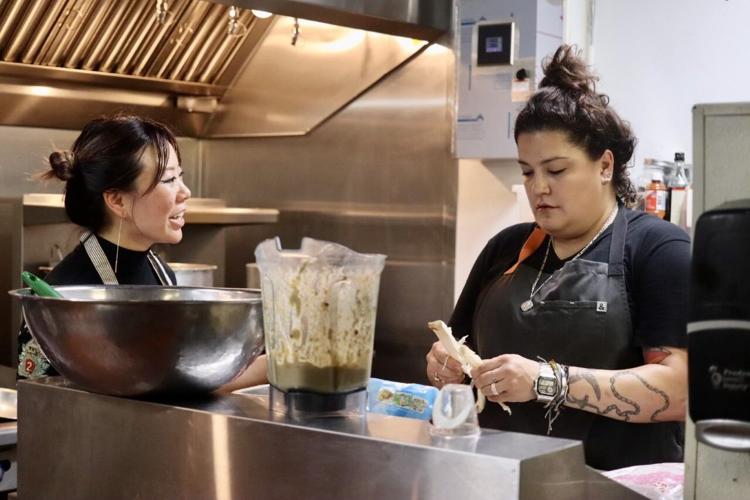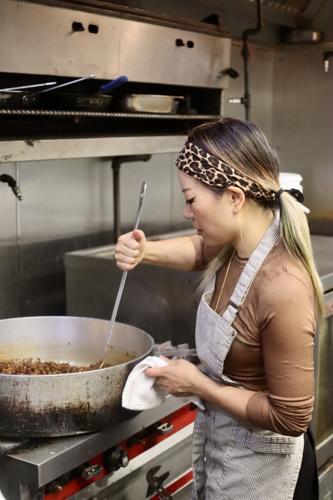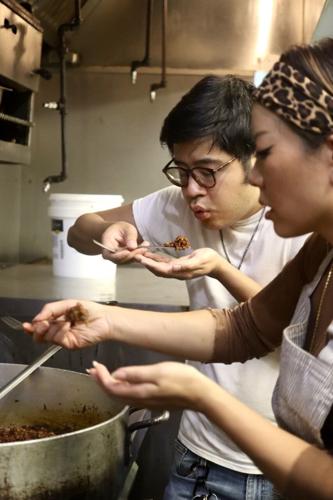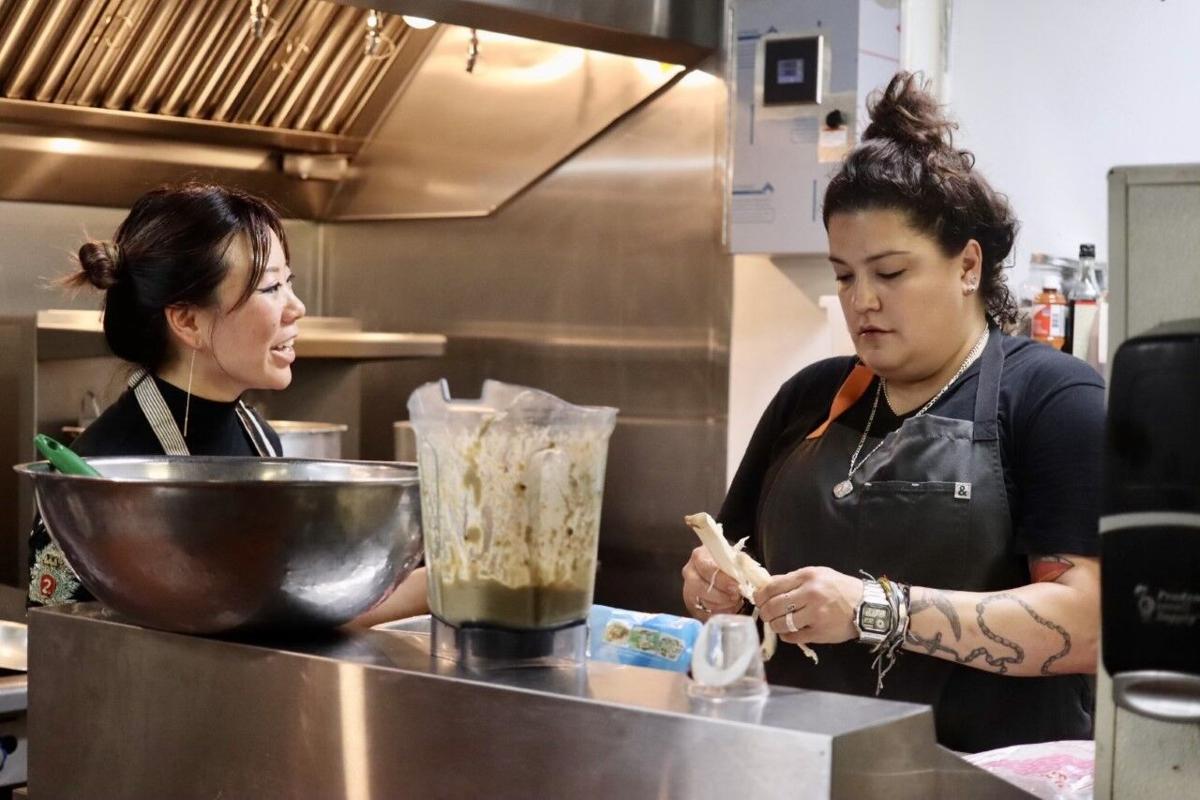The 1888-CIAO-DTN hotline opens like a late-night adult phone call commercial, complete with an anonymous voice equal parts breathy and suggestive. It’s for Ciao Downtown, the brash, stylish brainchild of Feng-Feng Yeh, who left the fashion industry in New York during the pandemic.
The site advertises “recipes for healthy hedonism” and includes the primary contact information for the organizer of Tucson’s Chinese Chorizo Project. The project surrounds Chinese chorizo, a “food symbol of Chinese and Mexican immigrant solidarity,” which Feng-Feng is unearthing as part of a grant through Tucson's Museum of Contemporary Art.
When Feng-Feng was growing up in Tucson, she did not see her Chinese-American identity reflected in her community.

Feng-Feng Yeh is the organizer behind the Chinese Chorizo Project.
“American, to me, growing up, was Stephanie Tanner from ‘Full House.’ I didn’t look like her; I wanted to look like those girls,” Feng-Feng said. “I wanted that representation in media. I’m glad it is changing now, but I always felt really alienated.”
She left for New York City at her first opportunity, to attend college at the Fashion Institute of Technology. But when the pandemic hit, she quit her job in fashion and eventually came home. She was searching for a project rich with meaning. She found a sausage.
Chinese chorizo was born out of necessity. “The original recipe was whatever they couldn’t use,” Feng-Feng said. “If meat was almost going to spoil, not good enough to cook on its own, they’d put bologna in and all the stuff they couldn’t use, and put spices and vinegars and red wine in it. They made it into something that was in high demand and delicious, and that people really wanted to buy.”
The Chinese Chorizo Project includes a festival of restaurants using the fusion ingredient this October, with the tagline “Ask how the sausage gets made.” Feng-Feng wants people to engage not just with this delicious food, but with its context.

Jackie Tran is one of the foodies working with Feng-Feng Yeh on the upcoming Chinese Chorizo Festival.
Chinese chorizo was made in Chinese groceries, which by 1950 numbered over 100 in Tucson. These groceries were mostly run by Chinese men, who were only allowed to remain in the country after the Chinese Exclusion Act if they worked a profession in high demand: railroad, medical, merchants. (Chinese women were discouraged to come to the States by the Page Act, which allowed officials to turn away any immigrant they thought was a prostitute — any woman they wanted to.)
“Men couldn’t bring their wives. It was difficult for them to build families,” Feng-Feng said. “Because they were living closely and next to Mexican communities in the barrio, they were able to build a community. They were able to build those grocery stores, and those grocery stores became centers for community. They spoke Spanish in the grocery stores; they spoke Indigenous languages.”
The grant funding the Chinese Chorizo Project stipulates that the festival is embedded in the community. Feng-Feng has been interviewing members of the community, from culinary professor Darryl Wong to El Charro’s chef, Carlotta Flores.
“[Carlotta] lived that. She said the credit thing was a big thing for her family, a big thing for communities at the time; you could pay it back later or not at all,” Feng-Feng said. “For her community, they’d run to the Chinese grocery store, put it on their tab, do their whole day, get their money, and pay their grocery tab. I’m going to give this to you and then it comes back. I thought that was a beautiful story.” My colleague Cathy Burch reported that El Charro would have closed decades ago if not for these grocers’ lines of credit.
“I’m just learning about how it became obsolete; how these grocery stores became obsolete,” Feng-Feng said. “I was just speaking to Darryl Wong, a culinary professor at Pima Community College. His family had a restaurant and grocery store here too.
“He was saying that in his generation, the Circle Ks and 7-Elevens would take over the markets, the revenues from the markets … People had to learn how to pivot and survive, so they abandoned those [markets].
“I just connected with Nancy Fung, a realtor here. [Her family] lived in the back of their market, T&T Market. They grew up in the market, worked in the market. It’s really touching to hear all this backstory and learn the history of Chinese people in Tucson. It’s something I never encountered as a Chinese-American growing up in Tucson. It’s really touching to be able to hear these stories and learn more about my roots.”
Feng-Feng has been acting as the cultural archaeologist, unearthing a forgotten object that places Chinese Tucsonans in context: in solidarity with their Mexican, Indigenous and Black neighbors in the barrio — especially Barrio Viejo, which was razed to create the Tucson Convention Center and where Feng-Feng hopes to site the project’s associated 11-foot Chinese chorizo mosaic sculpture.
Feng-Feng didn’t know about Chinese chorizo growing up in Tucson. “Doing this work kind of is for those little Feng-Fengs of today, who live in Tucson and don’t have a sense of, where am I? How do I fit in in this culture?” she said.
“There’s a saying in Chinese, it’s like a proverb that means, leaves return to their roots,” Feng-Feng said. “It’s really funny because my last name, the character means leaf, actually. So it’s me coming back to my roots literally. I think that’s really funny to find a proverb as well. And to be actually doing that.”
Try Chinese chorizo at these restaurants participating in the Chinese Chorizo Project this month. Vegan, mushroom-based options are available. Each restaurant will create their own dishes using the chorizo.
The lineup of standout restaurants is thanks in part to foodies like Jackie Tran, who Feng-Feng ran into while living in New York full-time. Feng-Feng and Jackie are creating Chinese chorizo in collaboration with Chef Maria Mazon of BOCA and Ben Forbes of Forbes Meat Company, using ingredients sourced locally. The festival is in partnership with Tucson Foodie.
Oct. 14-16
BOCA by Chef Maria Mazon, 533 N. Fourth Ave.
Cafe a la C’art, 150 N. Main Ave.
Cup Cafe, 311 E. Congress St.
Fatboy Sandos, food truck
5 Points, 756 S. Stone Ave.
Forbes Meat Company, 220 E. Broadway
Penelope Wood Fired Pizza, inside Cartel Roasting Co., 210 E. Broadway
Tooley’s Cafe, 299 S. Park Ave.
Oct. 21-23
Ceres, 77 W. Washington St.
Charro Vida, 7109 N. Oracle Road
El Chinito Gordo, 2920 N. Oracle Road
Forbes Meat Company, 220 E. Broadway
LaCo, 201 N. Court Ave.
Penca, 50 E. Broadway
Tucson Tamale Company, 7286 N. Oracle Road
Oct. 28-30
The Coronet, 198 W. Cushing St.
Forbes Meat Company, 220 E. Broadway
Maynards, 400 N. Toole Ave.
Noodies, 1730 E. Speedway
Tito & Pep, 4122 E. Speedway
Tran's Fats, food truck
Tucson Tamale Company, 7159 E. Tanque Verde Road
For more information, check out Chinese Chorizo Project’s website.

Great food and drinks start with great water
Restaurants, breweries and coffee shops know that clean, pure water is crucial. You can get that at home too with Kinetico Quality Water. Kinetico removes more contaminants than any other system. Get up to $500 off a non-electric, high efficiency, patented Kinetico system (restrictions apply). Visit KineticoTucson.com.
What does "supported by" mean? Click here to learn more.









